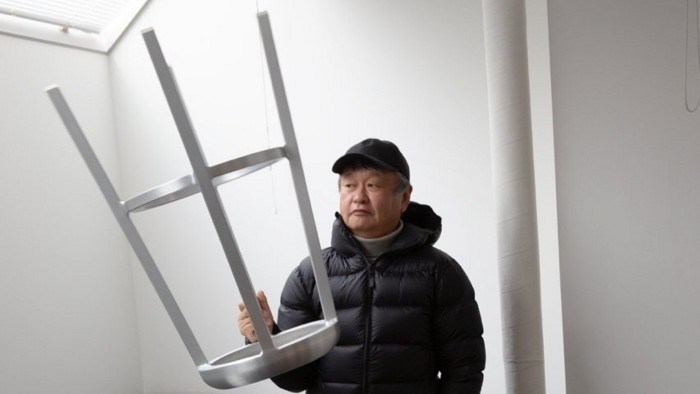Summarize this content to 2000 words in 6 paragraphs in Arabic Unlock the Editor’s Digest for freeRoula Khalaf, Editor of the FT, selects her favourite stories in this weekly newsletter.You might keep a beautifully designed spoon in your kitchen but, regardless, every time you open the cutlery drawer, “you use the same spoon without thinking”, says the Japanese product designer Naoto Fukasawa. That, says Fukasawa — best known for his work for the lifestyle brand Muji — is the power of “super normal”, a term developed in collaboration with the British designer Jasper Morrison two decades ago.The concept describes simple, utilitarian objects that perform their role almost invisibly — one of Fukasawa’s key design theories, or what he calls “ways of feeling”. It can be seen in the minimalist toaster and kettle he designed for Muji in 2014, or the simple stainless steel Itsumo cutlery created for Alessi in 2019 — the kind of objects that invite everyday use. “Super normal” is also one of the themes of the Philadelphia Museum of Art’s new exhibition on Fukasawa, which showcases roughly 100 objects he has designed over his career.“He is not only a prolific, wonderful designer and maker, but also a really deep thinker on design and the role of the designer in contemporary life,” says Colin Fanning, curator of the show Naoto Fukasawa: Things in Themselves. “He’s one of those people, much like Dieter Rams, where everyone lives with something that he has designed,” says Fanning. Not a household name, perhaps, but a household presence.Trained in product design, Fukasawa started out at the electronics company Seiko Epson, before working for multidisciplinary design agency IDEO, focused on technology. He founded his eponymous company in 2003, producing a diverse range of objects: from electrical goods and kitchenware for Muji, to chairs and tables for major European furniture brands including Molteni&C and HAY.Fukasawa has been an adviser for Muji since 2002, drawing on the tradition of Mingei, the Japanese movement celebrating anonymous, “ordinary” craft (“Muji” is short for Mujirushi, which means “no brand” in Japanese). Reflective of his deep love for Mingei, Fukasawa is currently the director of the Japan Folk Crafts Museum (Mingeikan). He is also co-director of 21_21 Design Sight, one of Japan’s first design museums.In recognition of his quiet, masterful impact, the Philadelphia Museum of Art is presenting Fukasawa with the 2024 Collab Design Excellence Award, alongside hosting Things in Themselves. The exhibition is organised not by chronology or typology, but by four of Fukasawa’s “ways of feeling”: “without thought”, “super normal”, “outline” and “emergence”. “Without thought” refers to Fukasawa’s belief that unconscious human habits are a source of inspiration for design; “outline” considers the holistic context of an object to better design it; “emergence” celebrates the qualities of materials, designers and manufacturers, and how through collaboration they can form something greater than the sum of their parts.These are designs for everyday life, certainly, but there is a distinct element of joy to them, too. One of Fukasawa’s best-known objects is a wall-mounted CD player for Muji, designed before he started his advisory role in 1999. A minimalist, white, square unit with rounded corners, it is operated by pulling on a hanging white cord. For Fanning, the design is both intuitive and playful.The Muji philosophy is less is more. But it has to be friendly . . . people must have things they love“It’s such a lovely encapsulation of this idea that you can map a behaviour that’s very familiar — in this case, the pull chains that activate wall-mounted ventilation fans in many kitchens in Japan,” he says. Fanning believes Fukasawa has translated the “unconscious habit” of seeing a cord and wanting to pull it, to an object that typically doesn’t require such an action. “It is, I think, a quite humorous gesture,” says Fanning, “and that’s something I hope comes through in the show: the work is beautiful and refined, but there’s also this underlying current of fun to a lot of it.”But Fukasawa is wary of designing technology that soon becomes obsolete. “Once the function gets older, beautiful design is useless,” he says. “Disappointed to be designing things with a short shelf life” early on in his career, he turned to furniture and interiors. His designs include sleek white plastic tables for B&B Italia, geometric metal lamps for Artemide, simple wooden armchairs for Maruni and aluminium stools for Emeco. Similar to his product designs, he wants these pieces to be intuitive and “super normal”. “It’s not really necessary to be radical,” he says. When it comes to interiors, Fukasawa says he is “in charge of designing the background” to people’s home lives.He adds that there is a “fine line” between designing too little and too much — a spirit one can see in the output of Muji, as well as Fukasawa’s own studio. Fukasawa believes the designs do not prescribe a life of minimalism; simple, humble, utilitarian objects might be vital for daily life, but people still need “special things”, he says. “The Muji philosophy is less is more. But it has to be friendly . . . people must have things they love.”To April 20; philamuseum.orgFind out about our latest stories first — follow @ft_houseandhome on Instagram
رائح الآن
rewrite this title in Arabic Naoto Fukasawa: the ‘super normal’ hero’s new design show
مال واعمال
مواضيع رائجة
النشرة البريدية
اشترك للحصول على اخر الأخبار لحظة بلحظة الى بريدك الإلكتروني.
© 2026 جلوب تايم لاين. جميع الحقوق محفوظة.









